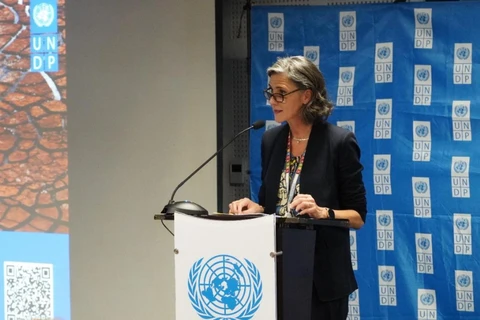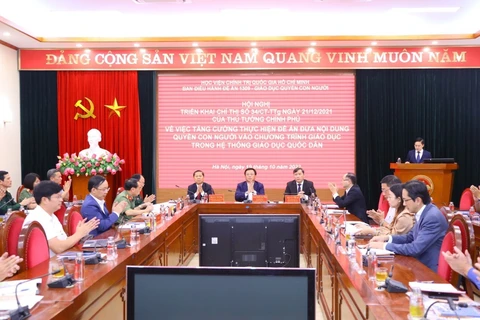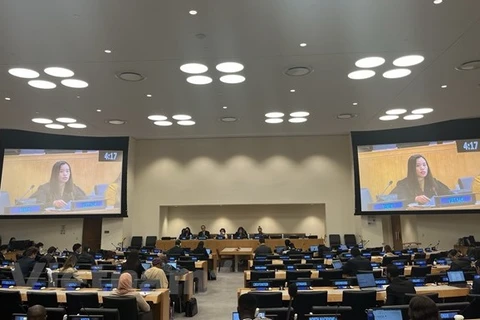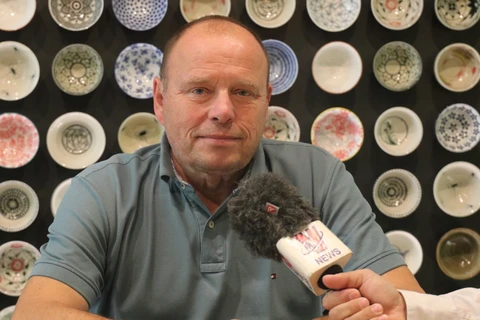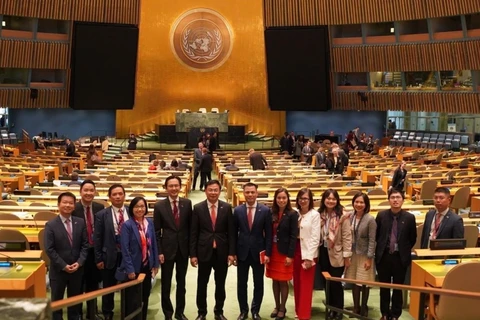 Mong ethnic people gather in Po Ngai, one of the seven religious practicing sites in Huoi Luong commune (Phong Tho district, the northern province of Lai Chau) to pray and read the Bible together. (Photo: VNA)
Mong ethnic people gather in Po Ngai, one of the seven religious practicing sites in Huoi Luong commune (Phong Tho district, the northern province of Lai Chau) to pray and read the Bible together. (Photo: VNA) Hanoi (VNA) - Vietnam has proactively increased its engagement in the United Nations’ mechanisms related to human rights. This is in line with the consistent stance of the Party and State that considers ensuring and protecting human rights a cornerstone policy.
After 36 years carrying out Doi Moi (Renewal), Vietnam has emerged as a bright spot of growth in the region and the world with impressive economic achievements.
However, hostile and reactionary forces continued with their attempts to smear the image and prestige of Vietnam. These forces incited hostile attitudes to undermine the country’s national unity by distorting the Vietnamese Party and State’s directions and policies on certain issues, including human rights.
Vietnam has firmly refuted the groundless, partial and inaccurate assessment and propaganda about the situation in the country. The country has been working to enhance awareness of its contingent of officials from central to local levels about human rights. They do this to ensure the completion of its commitment as a member of international conventions on human rights, strengthening its national “soft power” so as to confidently join in the global playground.
VietnamPlus introduces a series of stories on some aspects of the human rights situation in Vietnam and the country’s work to protect human rights.
Part 1: Sabotage attempts hide under heresy phantom
Hiding under the “heresy phantom”, hostile exile Mong organizations have been conducting activities to incite and spread the idea of separation and self-independence among ethnic people in some remote mountainous areas in the north or the Central Highlands (Tay Nguyen). All of those attempts are aimed at dividing the national unity, devaluing the prestige and revolutionary achievements of the Vietnamese Party and State, and abolishing the leadership role of the Communist Party of Vietnam.
In the northern provinces of Dien Bien and Lai Chau, some heresies like Gie Sua and Ba Co Do emerged, spreading superstitious beliefs and distorted contents of the Bible among locals. To cause unrest, stories were created about a huge disaster or even an imminent Apocalypse. They promised that a King of the Mong would come to rescue and take the Mong ethnics to a dreamland where all would live in richness. Those heresies had their origin in the Mong community in the US.
For example, the founder of the Ba Co Do heresy is Vu Thi Do, a Mong ethnic living in the US. Do and her sidekicks in the US have sent a total of 600 million VND (over 24,130 USD at current rate) to the operators of the heresy in Muong Nhe district (Dien Bien province).
Many local Mong ethnics were wooed by money gifts along with promises of a rich life without having to work, and followed the instruction of the heresies.
In May 2011, many Mong ethnics, from young to old, both men and women, travelled from many northern and central highlands localities to Muong Nhe district to join in the establishment of a so-called Mong Kingdom.
More recently, in early 2020, nearly 400 people gathered at Muong Te district (Lai Chau) to conduct a ceremony announcing the establishment of a so-called “Mong State”.
But in reality, neither Apocalypse nor a Mong King has come to take the Mong to the so-called promising lands.
Instead, the organisers of such illegal gatherings were arrested and punished in accordance with the law. Those who were duped to attend were given help from the local authorities, the police and the military to return to their home.
Sung Va Linh, one of the hundreds of Mong ethnics who participated in the event to found a “Mong State” in Muong Te district, shared with VietnamPlus correspondents that he and his family members were deluded by the money and promises of wealth without having to work given by the heresy.
In the Central Highlands province of Kon Tum, a heresy called Ha Mon or Gyin appeared in late 1999 and then spread to Gia Lai and Dak Lak. It was set up by a local Ba Na ethnic named Y Gyin, who boasted that he saw St Mary appear on the roof of his house. He claimed that the Apocalypse was coming and those who follow her will be allowed to go to heaven while those who do not will have to go to hell.
He and some members of the exile FULRO reactionary organization used the fabricated story to entice local Catholics to abandon their genuine religion to follow their heresy.
More dangerously, the heresy incited followers to protest the local administration and cause unrest and division in the locality.
Besides, taking advantage of the policy encouraging digital transformation and international integration, hostile and reactionary forces have used the internet to publish untrue and bad information aiming to sabotage the Vietnamese Government.
The Ba Co Do heresy is an example of this. Lieutenant Colonel Lu Van Hoan, chief of the police force of Muong Te district said Do published many video clips on youtube.com to promote a State of the Mong ethnic group.
According to Dinh Tien Dung, deputy head of the external information department under the Ministry of Information and Communication, false information spread by heresies not only causes public confusion, but also poses the risk of social unrest because the real political and economic situation is distorted.
He noted that exile reactionary groups use the internet to contact their counterparts in Vietnam. They also set up closed groups operating publicly on social platforms, and publish false information on social platforms with large numbers of users, aiming to incite sabotage, unrest and even terrorism, towards the goal of abolishing the socialist regime in Vietnam.
In the next part, VietnamPlus will cover the policy and measures taken by the Vietnamese State to respond to the schemes of hostile forces, and protect and ensure human rights in the country./.
